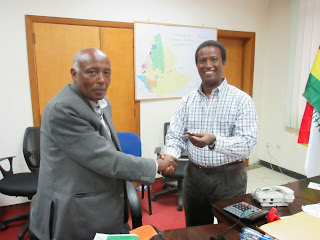Bible translation is getting a new boost in Ethiopia!
For several decades, the Summer Institute of Linguistics (SIL)
people have worked on Bible translations for Ethiopia’s primary languages. But
this country has over 80 different languages and dialects that need Bible
translation. Approaching the task the traditional way would, no doubt, take
multiple decades more.
A couple years ago, a handful of the national Ethiopian
staff working with SIL decided to form their own registered organization that would
work alongside SIL, but tackle the challenge with some new approaches intended
to speed up the translation process. In particular, they wanted to create
stronger partnership with national church denominations to encourage greater
participation in translation at the grass-roots level.
 |
| Leading the WE in a management workshop (above) Tefera receiving the 11th translation of OBS (below) |
For four full days during this trip of mine to Ethiopia, I’ve
had the privilege of working with the WE director, Tefera, and his leadership
team in crafting a new strategic plan and discussing how to develop
organizationally into a strong, successful ministry. It’s always fun working
with emerging African ministry leaders, but this experience of helping to
crystalize the dreams and aspirations of these WE brothers and sisters has been
especially rewarding. What has surprised me is that their vision is not only to
be a catalyst to Ethiopian churches for Bible translation, but they believe
their influence and resource help should spread beyond the borders to the other
countries of Africa as well.
It’s one thing to sit in a room for a several days talking
about strategy, but during this time, I’ve also had a chance to witness WE
already at work at tackling those 80 national languages that need God’s Word.
Using a brand new approach to an initial Bible resource called Open Bible
Stories (supplied by Wycliffe Associates) WE has challenged national churches
to translate the labels of the fifty picture-stories into local languages as
quickly as possible. WE’s goal is to have OBS available in all of Ethiopia’s
languages done by the end of this year! If you think they’re dreaming, get
this: WE completed the first Amharic version of OBS on March 10 and while I was
here in the office, a key church leader showed up to deliver the eleventh language
translation already completed! That means in just seven weeks, twelve Ethiopian
language groups now have access to the story of the Bible that didn’t have it before!
 |
| Introducing Tefera and Shimeles at a coffeeshop (above) Sharing about OBS with church-planting ministries (below) |
God has certainly done much through the faithful Western
missionaries in Africa during the past hundred years. But I can’t wait to see
what happens when He fully empowers this new generation of African ministry leaders
to fulfill their dreams and visions for reaching the world for Christ. If this
past week and a half in Ethiopia is any example of that, we’re in for some
exciting days ahead!









